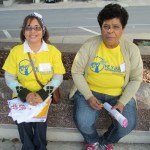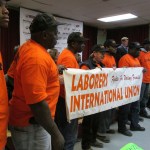public health
by Kim Krisberg
In a little less than a month, public health workers and their community partners in Macomb County, Mich., will set up at the local Babies"R"Us store to offer parents a free child car seat check. The Macomb County Health Department has been organizing such car seat checks for years now, knowing that proper child vehicle restraints can truly mean the difference between mild and severe injuries, or between survival and death.
The car seat check is taking place April 4 in observance of the fourth day of this year's National Public Health Week (NPHW) celebration, which officially…
by Kim Krisberg
Texas construction workers who've lost their lives on unsafe worksites may be gone, but they certainly haven't been forgotten. Earlier this week, hundreds of Texas workers and their supporters took to the streets to demand legislators do more to stop preventable injury and death on the job. They took their demands and the stories of fallen workers all the way the halls of the state capitol.
Just two days ago, workers from every corner of the Lone Star state made their way to Austin to take part in the Day of the Fallen, a day of action to memorialize construction workers…
Fifth of five student guest posts by Jonathan Yuska
The saying, “The more you know, the more you can control,” is no more meaningful than when used in the context of HIV detection and prevention. Public health advocates endlessly stress the need for knowing one’s status; and one would assume that any way in which the most amount of people can be tested would be beneficial for the population1. The Food and Drug Administration shared this same idea when they overwhelmingly approved the first ever over-the-counter (OTC) HIV testing kit in 20052; which in theory, sounds like a promising…
Second of five student guest posts by Nai-Chung N. Chang
Tuberculosis (TB) is a major disease burden in many areas of the world. As such, it was declared a global public health emergency in 1993 by the World Health Organization (WHO). It is a bacterial disease that is transmitted through the air when an infected individual coughs, sneezes, speaks, or sings. However, not all individuals who contract the disease will display symptoms. This separates the infected into two categories, latent and active. Latent individuals are non-infectious and will not transmit the disease, whereas active…
by Kim Krisberg
For many migrant farmworkers, the health risks don't stop at the end of the workday. After long, arduous hours in the field, where workers face risks ranging from tractor accidents and musculoskeletal injuries to pesticide exposure and heat stroke, many will return to a home that also poses dangers to their well-being. And quite ironically for a group of workers that harvests our nation's food, one of those housing risks is poor cooking and eating facilities.
A group of researchers and advocates recently decided to take a closer look at such facilities among migrant farmworker…
by Kim Krisberg
After nearly three decades as a USDA food safety inspector, Stan Painter tells me he now feels like "window dressing standing at the end of the line as product whizzes by."
Painter, a poultry inspector with the Food Safety and Inspection Service (FSIS) stationed in the northeast corner of Alabama in the town of Collinsville, is a first-hand witness to USDA's recently proposed rule to speed up poultry inspection lines while simultaneously reducing the number of federal food inspectors and turning over much of the food safety oversight to plant employees, who could have little…
I have a post up today at the Scientific American Guest blog, discussing how an earthquake and denial led to prairie dog plague. It details an outbreak of plague in Victorian San Francisco--the first time plague hit the United States--and the many downstream consequences of that outbreak (which began in 1900 and wasn't really contained until 1908). While the story is over at SciAm, here I wanted to talk more about why the outbreak became such a public health disaster.
The outbreak was first recognized by Dr. Joseph Kinyoun, a bacteriologist who had been, until his transfer to San Francisco,…
Readers may be familiar with Matt Damon's charity work with water.org, an organization he co-founded. Water.org seeks to raise awareness of the lack of clean water by almost a billion people on earth, and lack of toilets by almost 2.5 billion--and more importantly, they work to remedy that situation by providing sustainable, local solutions. His new video brings awareness in a rather unorthodox manner: he's refusing to go to the bathroom until everyone on earth has access to clean water and toilets.
http://www.youtube.com/watch?feature=player_embedded&v=jQCqNop3CIg
by Kim Krisberg
A couple years ago, two Johns Hopkins University public health researchers attended a public hearing about the possible expansion of an industrial food animal production facility. During the hearing, a community member stood up to say that if the expansion posed any hazards, the health department would surely be there to protect the people and alert them to any dangers. The two researchers knew that due to limited authority and resources, that probably wasn't the case.
"We felt like there was this false sense of comfort among the public," said Roni Neff, one of the two…
I didn't grow up on a farm, but my dad did. He was the youngest of 13 kids, several of them who grew up to own farms of their own. As a kid, my family had almost an acre in the country, but the only animals we kept on it were stray cats and the occasional opossum (the latter, not on purpose). Still, the school I attended was definitely in a rural, farming community, and I frequently spent time at my Grandma's farm. She'd downsized since her kids were young and working the farm, but even when I was a kid and she was in her early 80s, she still kept chickens for eggs, cows for milk and meat,…
by Kim Krisberg
When it comes to good health, America is far from top dog.
Yes, we may spend the most, we may have some of the most advanced medical technologies and we may produce some of the best doctors. But when it comes to the ultimate measure of a health care system's success — the health of people and populations — it seems we are losing a winnable battle.
"There's hardly anything more consequential than Americans dying earlier and being sicker," Dr. Steven Woolf, chair of the Institute of Medicine's and National Research Council's Panel on Understanding Cross-National Health…
by Kim Krisberg
"To know you participated in building something in your city — it's just an experience, you know?"
Those are words from Austin, Texas, native Christopher McDavid, 22, a graduate of the city's newly established Construction Career Center. During his time at the center, McDavid got certified in flagger safety (flaggers direct the safe passage of traffic through construction areas), first aid and CPR, and basic concrete work and received his OSHA 10 certification, which he said "has opened my eyes to actually see the things that can be harmful to me."
Now, McDavid is looking for…
by Kim Krisberg
Dr. Paul Demers says he frequently finds himself having to make the case for why studying workplace exposures to carcinogens is important. Oftentimes, he says, people believe such occupational dangers are a thing of the past.
"A lot of people are still developing cancer and dying from cancer due to workplace exposures, but only a small fraction of those are compensated, so people may think the magnitude of this problem is small," said Demers, director of the Occupational Cancer Research Centre in Ontario, Canada. "I wanted to have better data."
And in just a few years, he will…
by Kim Krisberg
Amidst discussions of new gun control measures, a study finds that adding new settings where people can bring concealed weapons could increase the risk of some crimes.
The study authors note that while that risk is pretty small, it's still a risk and one that policymakers should take into consideration. Published in the January issue of the American Journal of Public Health, the study examined 2001–2009 data from the Texas Department of Public Safety on criminal convictions associated with holders and nonholders of concealed handgun licenses (CHL). It found that concealed…
by Kim Krisberg
It's often noted that immigrants to the United States experience a decline in health after adopting American lifestyle habits. However, a recent study has found that new immigrants might not be arriving in such good health after all.
Published in the December issue of Health Affairs, researchers put this hypothesis to the test: Are immigrants truly in better physical health than native-born Americans and does that reported health advantage erode after living in the U.S. or is it a product of undetected disease that's discovered after immigration? It's not only an interesting…
Last week, my home State of Michigan became the 24th one to enact "right-to-work" legislation. I'm sure the great labor leader Walter Reuther (1907-1970) rolled over in his grave when Michigan Governor Rick Snyder signed the anti-union bill into law.
Workers coming together to negotiate for better wages, benefits and working conditions created the middle class in America. Belonging to a union means workers can be more secure that they won't be fired arbitrarily, and have more power to receive skills training and guard against unsafe working conditions. This latter point is…
by Kim Krisberg
Workers in Travis County, Texas, are celebrating what advocates are calling a landmark victory, after local leaders voted to ensure that economic incentive deals benefit both big business and workers.
In late November, Travis County commissioners approved a new living wage requirement for companies wanting to move into the county and take advantage of the generous tax breaks the region offers to lure new business. The requirement creates a new wage floor of $11 an hour for all employees, including construction workers. On the same day as the county vote, a committee of the…
A recently published case-control study involving more than 2,100 women in southern Ontario, Canada reported a strong association between being employed in the automotive plastics industry and breast cancer. The researchers recruited the 'case' subjects between 2002-2008 among newly diagnosed breast cancer patients and the randomly-selected controls from the same geographic area. The researchers examined a variety of risk factors for breast cancer (e.g., reproductive history, age) and collected data on the women's employment history. Elevated odds of breast cancer were found among…
by Kim Krisberg
The collective experience of domestic workers — house cleaners, nannies and caregivers — often remains hidden from view. For all practical purposes, they work in regulation-free environments without the benefits of labor, wage and health protections or oversight. There are no HR departments in people's homes.
But a new survey released in November has pulled back the curtain on the conditions and experiences domestic workers face, documenting issues such as wage exploitation, preventable on-the-job injuries and the little — if any — power domestic workers have in improving…
This is a bonus addition to a series exploring the intersections between effectively caring for people living with chronic pain and the rise in unintentional poisoning deaths due to prescription painkillers. To read the three-part series, which explores the science of pain management as well as physicians' and public health workers' roles in preventing opioid abuse and overdose, click here, here and here.
by Kim Krisberg
"If you really look at how pain affects people and what it means to have pain...you start to view it more as a social phenomenon."
These are words from Dr. Daniel Carr, a…

